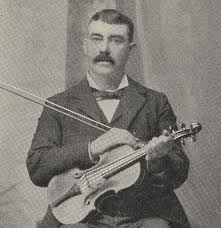Annotation:Pleasures of Hope (1): Difference between revisions
No edit summary |
No edit summary |
||
| (4 intermediate revisions by 2 users not shown) | |||
| Line 1: | Line 1: | ||
---------- | |||
---- | {{TuneAnnotation | ||
|f_tune_annotation_title=https://tunearch.org/wiki/Annotation:Pleasures_of_Hope_(1) > | |||
'''PLEASURES OF HOPE''' ("Taitneam an | |f_annotation='''PLEASURES OF HOPE''' ("Taitneam an dotcuis," "Suáilcí an dóchais" or "Aoibneasa an docais"). Irish, Hornpipe (whole time). D Major. Standard tuning (fiddle). One part (Williamson): AABB (Deloughery, Mulvihill, O'Neill): AA’BB’ (Harker/Rafferty). "The Pleasures of Hope" was the title of a didactic poem in heroic couplets written in 1799 by Scottish poet Thomas Campbell [https://en.wikipedia.org/wiki/Thomas_Campbell_%28poet%29] (1777-1844), which, among other things, championed the cause of Poles. | ||
[[File:mcfadden.jpg|300px|thumb|right|John McFadden]] Paul de Grae believes the tune may be source John McFadden's reworking of "[[Miss Carroll's Hornpipe]]," printed in piper O'Farrell's '''Collection of National Irish Music for the Union Pipes''' (1804, p. 51). | |||
<Blockquote> | |||
''Joyce's "[[Cordick's Hornpipe]]" is very close to O'Farrell's tune, but without the distinctive 'B' notes in bar four of the second part. Another variant is "[[Burns' Irish Hornpipe]]" in '''Ryan's Mammoth Collection''' (1883, p. 145)"<ref>Paul de Grae, "Notes on Sources of Tunes in the O'Neill Collections", 2017 [https://www.irishtune.info/public/oneill-sources.htm]. </ref>. | |||
</blockquote> | |||
'' | See also "[[Birnes Hornpipe]]" and Kerr's "[[Byrne's Hornpipe (3)]]." | ||
< | |f_source_for_notated_version=Chicago fiddler John McFadden, originally from County Mayo [O'Neill]. | ||
< | |f_printed_sources= Paul Deloughery ('''Sliabh Luachra on Parade'''), 1988; No. 157. Harker ('''300 Tunes from Mike Rafferty'''), 2005; No. 269, p. 83. Mulvihill ('''1st Collection'''), 1986; No. 43, p. 101. O'Neill (Krassen), 1976; p. 182. O'Neill ('''Music of Ireland: 1850 Melodies'''), 1903; No. 1637, p. 304 (hornpipe). O'Neill ('''Dance Music of Ireland: 1001 Gems'''), 1907; No. 864, p. 149. Williamson ('''English, Welsh, Scottish and Irish Fiddle Tunes'''), 1976; p. 82. | ||
</ | |f_recorded_sources=Liam O'Flynn - "The Piper's Call." | ||
|f_see_also_listing=Jane Keefer’s Folk Music Index: An Index to Recorded Sources [http://www.ibiblio.org/keefer/p05.htm#Pleofho]<br> | |||
'' | |||
Jane Keefer’s Folk Music Index: An Index to Recorded Sources [http://www.ibiblio.org/keefer/p05.htm#Pleofho]<br> | |||
Alan Ng’s Irishtune.info [https://www.irishtune.info/tune/3893/]<br> | Alan Ng’s Irishtune.info [https://www.irishtune.info/tune/3893/]<br> | ||
}} | |||
------------- | |||
---- | |||
Latest revision as of 02:48, 7 October 2020
X:1 T:Pleasures of Hope [1] L:1/8 M:C| R:Hornpipe S:O’Neill – Dance Music of Ireland: 1001 Gems (1907), No. 864 Z:AK/Fiddler’s Companion K:D (3ABc|d>AF>A B>GE>G|(3FED F>A d>cB>A|E>ee>f (3gfe f>d| e>cA>B A>GF>E|F>Ad>d d>AF>D|E>ee>f (3gfe c>A|d>fa>f b>ge>c|d2 {e}d>c d2:| |:(3ABc|d>fa>f b>ge>c|d>fa>f g>ec>A|d>fa>f (3gfe f>d|(3BBB B>A B>dA>G| F>Ad>d d>AF>D|E>ee>f (3gfe c>A|d>fa>f b>ge>c|d2 {e}d>c d2:|]
PLEASURES OF HOPE ("Taitneam an dotcuis," "Suáilcí an dóchais" or "Aoibneasa an docais"). Irish, Hornpipe (whole time). D Major. Standard tuning (fiddle). One part (Williamson): AABB (Deloughery, Mulvihill, O'Neill): AA’BB’ (Harker/Rafferty). "The Pleasures of Hope" was the title of a didactic poem in heroic couplets written in 1799 by Scottish poet Thomas Campbell [1] (1777-1844), which, among other things, championed the cause of Poles.

Joyce's "Cordick's Hornpipe" is very close to O'Farrell's tune, but without the distinctive 'B' notes in bar four of the second part. Another variant is "Burns' Irish Hornpipe" in Ryan's Mammoth Collection (1883, p. 145)"[1].
See also "Birnes Hornpipe" and Kerr's "Byrne's Hornpipe (3)."

